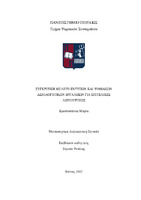Συγκριτική μελέτη έντυπων και ψηφιακών αξιολογητικών εργαλείων για επιτελικές λειτουργείες

View/
Abstract
Nowadays, Information and Communication Technologies (ICT) are an integral
part of modern education. They are skillfully integrated in all stages of the learning
process. One of the most important stages is assessment, through which learning
outcomes are measured. As we move through the digital age, the need arises for the
transformation of printed tools into digital ones. For this reason, the present work
aims to examine whether there is a correlation between children's performance in
the printed assessment essay and the digital one. These are evaluation tools that
measure the Executive Functions of children 6 to 12 years old. An attempt is made
to match the tests of the printed tests with digital games, which use the physical
movement of the body to interact with the interface of the platform. The Executive
Functions that are examined concern the attention and concentration of children
with developmental disorders. In particular, the skills of auditory and visual
memory, problem solving and inductive thinking in verbal and non-verbal context
are studied. The results of the experiment confirm the view that a digital
environment provides innovative evaluation solutions compared to the traditional
form. It proves to be more attractive and effective for the level of knowledge, skills
and abilities of the Executive Functions of children of the first school age.


